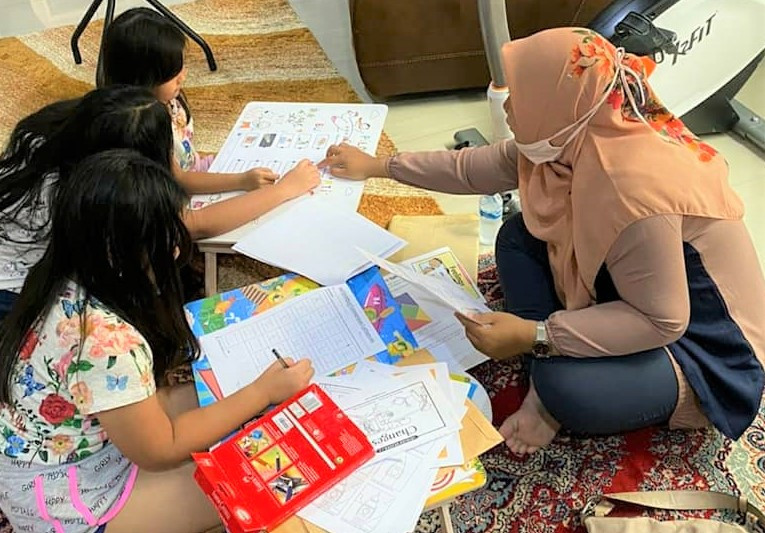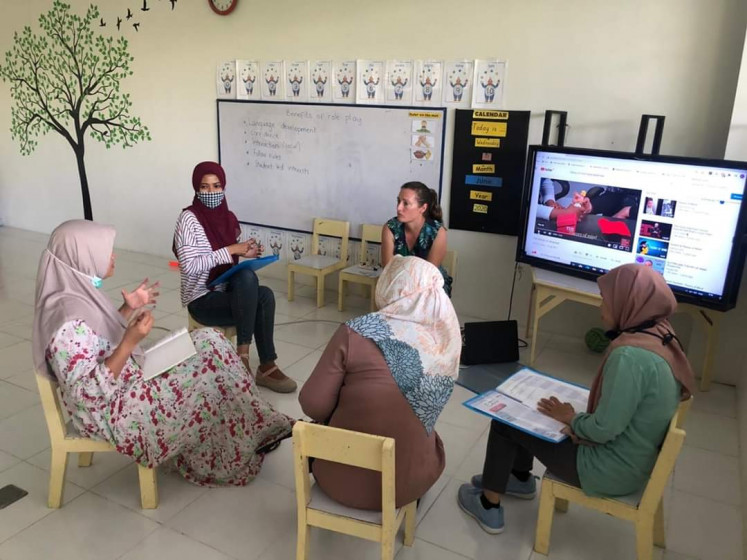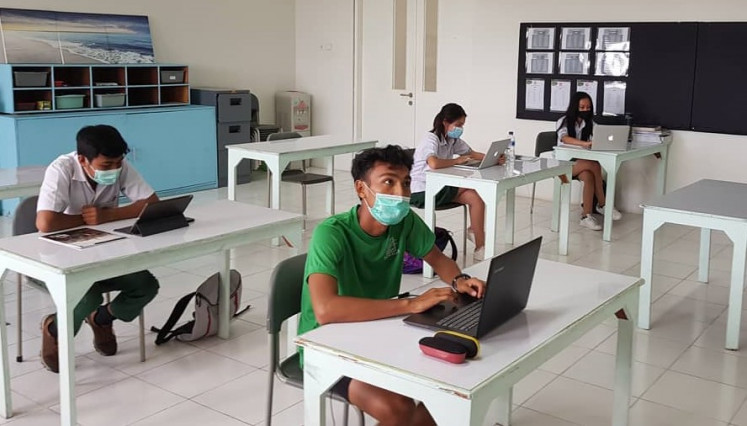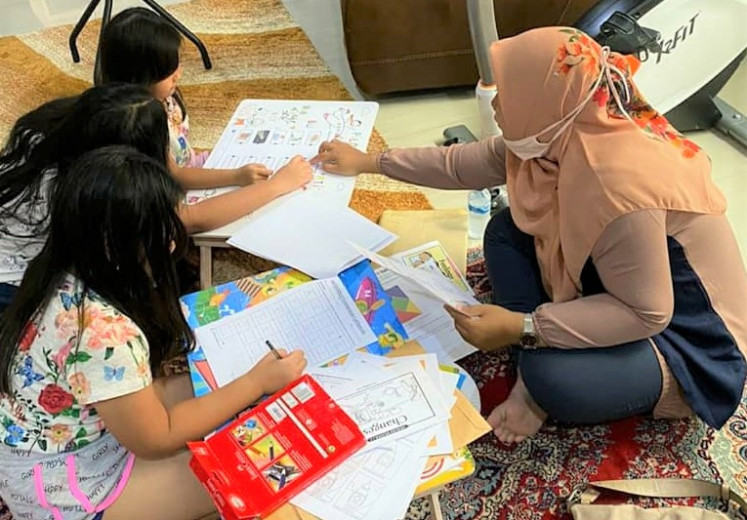Popular Reads
Top Results
Can't find what you're looking for?
View all search resultsPopular Reads
Top Results
Can't find what you're looking for?
View all search resultsCOVID-19 schooling: Learning from home in Lombok
It is back to school for many Indonesian students in January – and the smiles on children’s faces say it all.
Change text size
Gift Premium Articles
to Anyone
Schools have been closed in Lombok, West Nusa Tenggara since the government imposed COVID-19 restrictions in April 2020.
For nine months, classes have been held over the internet and in the homes of teachers and families. Now senior classes are permitted to reopen on the island – with COVID-19 protections in place.
But some parents and experts have raised concerns that school reopening should be delayed until a vaccine is available for children and teachers.
Meanwhile, globally, governments and education specialists are worried that a generation of children may have missed up to one year’s schooling as a result of the pandemic.
Briefed: Teachers prepare for distance learning at Sekolah Nusa Alam school in Lombok, West Nusa Tenggara in June last year. (Courtesy of Sekolah Nusa Alam/-)When schools were instructed to close in Indonesia, the Education and Culture Ministry advised that national examinations would not be held, and that schools were free to abandon the formal curriculum. Teachers were encouraged to innovate and adapt to a new “learning from home” mode.
The ministry later released an emergency curriculum, televised classes, and student worksheets, which could be downloaded and printed out for children to use at home.
But the way in which learning takes place at home, varies widely across the country. Most children and teachers do not have reliable access to the internet, the cost of duplicating learning resources is prohibitive for many, and so learning has continued in different ways in different places.
One school that has managed to provide individualized and group instruction throughout the closure is Sekolah Nusa Alam.
When COVID-19 arrived in Lombok in March 2020, teachers made preparations to go online. And when classes resumed for the final term after the March 2020 break, they were “virtual”.
The creativity and hard work of teachers, parents and children ensured the learning continued.
Daily exercise and sport classes took place in lounge rooms and backyards across Mataram, academic lessons were held on Google, assignments were submitted and marked online, art and science activities were in the kitchen, and individual coaching and counselling took place on WhatsApp or in occasional house visits.
Tests and exams were held on the internet, and some classes even went on a virtual camp – with tents erected in backyards and activities coordinated over the internet.
This focus on digital learning and online platforms to enhance the management and delivery of education could be a timely change. Indonesia faces major challenges in education – compounded by distance and remoteness. The country lags behind the developed world in terms of digital access and students’ learning outcomes.
However, Indonesians are quick to adapt and adopt new technologies when they are affordable and meet their needs – and schools like Sekolah Nusa Alam can lead the way.
The school was recently re-accredited by Cambridge International and by the Indonesian government as a satuan pendidikan kerjasama (SPK), or “international-standard” school. Established in 2000, Sekolah Nusa Alam is the only SPK school in Lombok, meaning it is the only school licensed to teach both a national and an international curriculum.
Back in school: Secondary students socially distance for face-to-face learning during a simulated lesson at Sekolah Nusa Alam in Mataram in December. (Courtesy of Sekolah Nusa Alam/-)The school is also the only school on the island that is licensed to teach the Cambridge International curriculum, ranging from early childhood to secondary levels, and is an accredited testing center for the Cambridge International General Certificate of Secondary Education (IGCSE) in Year 10.
While digital learning may be the future, educators agree that there will always be a place for face-to-face learning.
“Children learn best in groups,” explained Peter Greener, principal of Sekolah Nusa Alam. “We are committed to reopening our school and providing students with opportunities to learn in face-to-face classes on site as soon as it is deemed safe to do so.”
“The safety and well-being of our community is at the forefront of all of our decisions,” he continued. “The leadership team planned for a safe return to campus that prioritizes the health and safety of our community. A COVID-19 protocol for our school outlines the steps that ensure we minimize the risk of infection.”
A week-long simulation of face-to-face learning was conducted in December 2020 and on Jan. 18 the school is scheduled to reopen.
Face-to-face lessons will run from 9 a.m. until noon. Government regulations limit contact teaching to three hours. Teachers continue online learning in the afternoon session.
“Although the government considers it safe for students to return to school, we understand that some families are not yet comfortable with this,” Greener explained.
“Lesson outlines and learning resources including videos, reading material and interactive activities are still available on the student's Google Classroom learning platform. Teachers contact students learning at home in the afternoons for one-on-one instruction.”
Home visit: A teacher visits the home of her students during the school closures in Lombok, West Nusa Tenggara in November 2020. (Courtesy of Sekolah Nusa Alam/-)Since moving three years ago to a new campus in Mataram city, the school has survived major earthquakes in 2018 and the pandemic in 2020.
“Not only have we survived, we have thrived,” said Sopantini, head of the school’s board of management and one of the school’s founders.
“It is the strength of our school community that makes the difference. Sekolah Nusa Alam caters for both Indonesian and expatriate children. We focus on academic achievement, English language and a well-rounded international education.”
Education consultant and a member of the school board, Sri Widuri, said that while online education offered a solution for schools like Sekolah Nusa Alam during the pandemic, there was much to learn about the effects on children’s learning.
“It obviously suits some children better than others. What about children in remote communities without internet access? What about disabled children? Do girls always get the same access to online learning as boys? These are questions we need to answer,” Sri said.
As the children return to school, teachers will be quick to assess their learning and the impact that over nine months of learning from home has had on their education.
A flexible curriculum, which enables teachers to teach children at the right level will be crucial to ensure that children do not suffer from COVID-19 learning loss.
-- The writer is a member of the board of Sekolah Nusa Alam in Lombok, West Nusa Tenggara.














